Two cup finals and a relegation - remembering Ravenelli, Juninho and Middlesbrough’s rollercoaster ride 25 years ago
Middlesbrough’s story in 1996-97 had everything. Star names, spectacular moments. Cup finals, controversy, chaos. Regal results and relegation.
It ended on May 17, 1997, with the 25th anniversary of Boro’s maiden FA Cup final appearance, against Chelsea, arriving tomorrow.
Advertisement
Hide AdAdvertisement
Hide AdUltimately, the game was a harrowing one and a microcosm of their roller-coaster season.
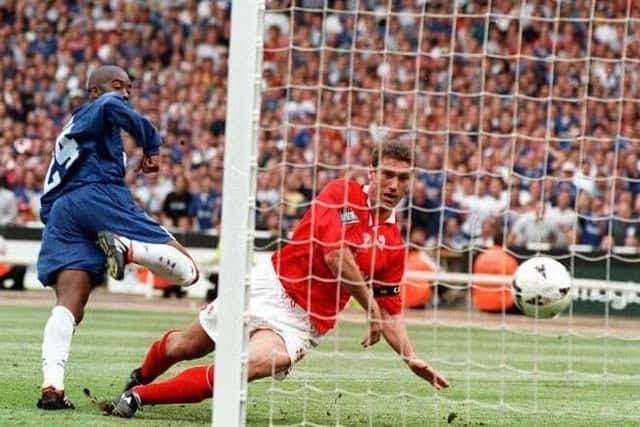

Just 43 seconds were on the clock when Roberto Di Matteo fired a stunning drive past Ben Roberts.
Relegated six days earlier at Leeds, Boro struggled for air at Wembley – where a cruel equaliser two minutes from the end of extra time from Leicester City’s Emile Heskey shattered hopes of glory for Bryan Robson’s side in the League Cup showpiece in the previous month.
Boro would lose the replay, also in extra time, at Hillsborough.
Advertisement
Hide AdAdvertisement
Hide AdOn their second appearance on the hallowed turf against Ruud Gullit’s Chelsea, Boro toiled in a first half which saw Fabrizio Ravanelli and Robbie Mustoe depart due to injury.
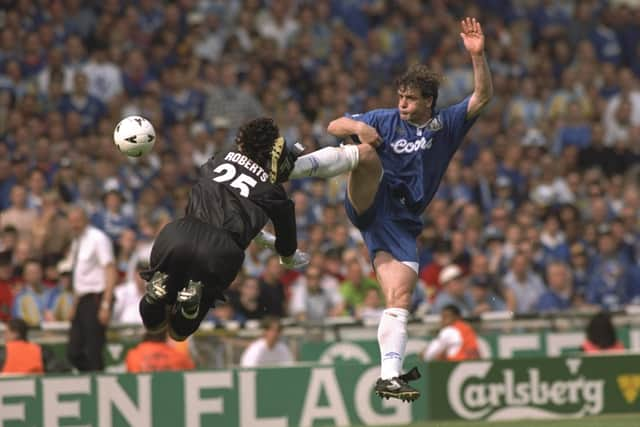

To compound matters, they then had the misfortune to see an equalising ‘goal’ ruled out in injury time when Gianluca Festa headed home Phil Stamp’s cross.
A linesman immediately flagged for offside, but TV evidence showed that the goal should have stood.
In the second half, Juninho – in his final appearance of his first spell for the club – was cynically hacked down by Di Matteo just outside the box. Controversy reigned when no red card was shown. A controversial moment in a controversial season.
Advertisement
Hide AdAdvertisement
Hide AdChelsea sealed victory thanks to a strike from Eddie Newton and for Boro’s fans, there were more tears.
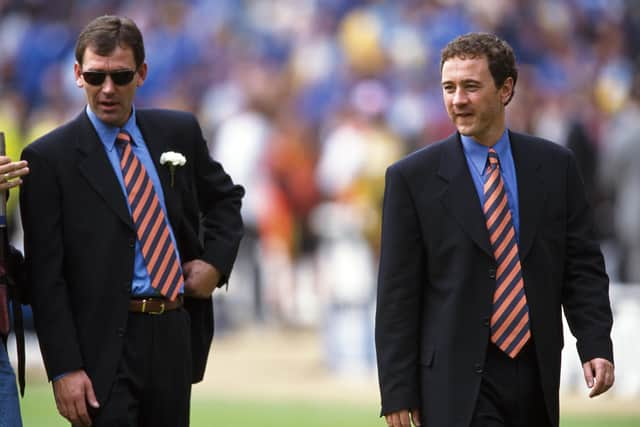

It was ultimately another tale of failure for the Teessiders. Although there were several stories behind the story.
Boro’s preparation for the final couldn’t have gone any worse. ‘Awful’ was the word used to describe it by stalwart midfielder Mustoe.
They may have gone down without much of a fight at Wembley, but there was plenty of in-fighting ahead of it.
Advertisement
Hide AdAdvertisement
Hide AdIt centred around the tempestuous Ravanelli, a player who could be devastating on the pitch, but a diva off it.
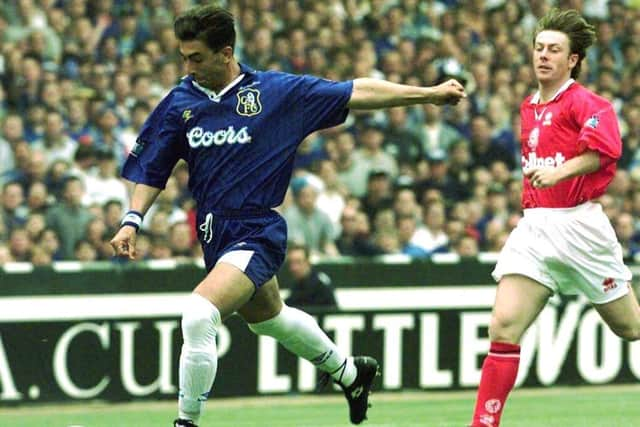

The Italian was involved in a much-publicised scuffle with team-mate Neil Cox on the morning of the final. In a newspaper interview, Cox – asked his thoughts about what Boro’s team should be – picked Mikkel Beck to start up front ahead of Ravanelli, who had been receiving treatment back in his homeland for 10 days on a hamstring problem.
In the team hotel, Ravanelli took umbrage with Cox after reading the interview.
Speaking years later, Cox said: “That team I went with was just my opinion and I think the rest of the squad felt the same. But we’d had such a hard season and the manager was under so much pressure, he gambled on Rav.
Advertisement
Hide AdAdvertisement
Hide Ad“Anyway, Rav read my interview on the morning of the game and took a swing at me while we were having a team picture taken. He spat at me first. I retaliated and it all got broken up.”
On the team bus to Wembley, comedian Stan Boardman was present at the behest of Robson. The Scouse comedian had famously been part of the Sheffield Wednesday entourage ahead of their League Cup win over Manchester United in 1991, with Ron Atkinson successfully using the tactic to settle Owls players and get them in good spirits ahead of the final.
It did not exactly do the trick for the Boro contingent.
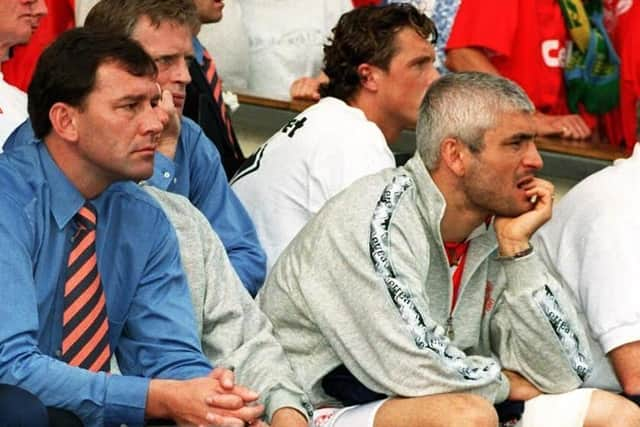

Cox continued: “Juninho was the first to push Rav away (from the scuffle with him) and say he was bang out of order but Juninho liked the banter as well.
“And so he had got on the coach driver’s microphone and said ‘right let’s get ready for this boxing bout at the back of the bus.’ That was a cue for Stan to make fun out of the ding-dong we’d had as well as taking the Mickey out of Germans and Italians, which Rav didn’t take well.”
Advertisement
Hide AdAdvertisement
Hide AdWhen the action got under way, Ravanelli – who scored 31 goals in all competitions in that season including a memorable hat-trick on his debut against Liverpool – limped off after 24 minutes.
It was another unfortunate development on an acrimonious day.
Boro’s 30,000-strong contingent let their feelings known in no certain terms ahead of kick-off.
They were full of resentment at the Football Association’s decision to dock them three points for failing to fulfil a fixture at Blackburn in December and vented their spleen in the direction of chief executive Graham Kelly.
Advertisement
Hide AdAdvertisement
Hide AdIf Boro had not suffered the points penalty, they would have finished four places above the relegation zone.
In the event of the club retaining their place in the Premier League, Robson had lined up three world-class talents, including Roberto Carlos. Miguel Angel Nadal was another target.
It was a season when the stellar names of Ravanelli, Emerson and Juninho took centre stage. While the latter lit up the Premier League throughout 1996-97, the other two – while being explosive talents on their day – also courted notoriety.
For a short window at the start of that campaign, Emerson was arguably the most influential player in the top flight. A midfielder who seemingly had everything, only to be ultimately let down by his attitude.
Advertisement
Hide AdAdvertisement
Hide AdThe Brazilian, unsettled by reports of interest from Spanish giants Barcelona, went AWOL for a spell before eventually returning. He was never the same player.
The pivotal moment in Boro’s season would arrive just before Christmas and the game at Blackburn. Boro, without 23 players due to a debilitating combination of illness and injury, sought guidance from the Premier League and were warned unequivocally that there were clear rules against arbitrary postponements. Boro – who only had 12 available senior players, including three goalkeepers – took the fateful decision to postpone the match.
Despite medical evidence backing their case, Boro were fined £50,000 and – crucially – deducted three points the following month after an independent tribunal.
The decision was upheld despite chairman Steve Gibson deploying formidable barrister George Carman to argue Boro’s case at an FA appeal. Carman, who once successfully defended comedian Ken Dodd on tax evasion charges, suffered a rare defeat.
Comment Guidelines
National World encourages reader discussion on our stories. User feedback, insights and back-and-forth exchanges add a rich layer of context to reporting. Please review our Community Guidelines before commenting.